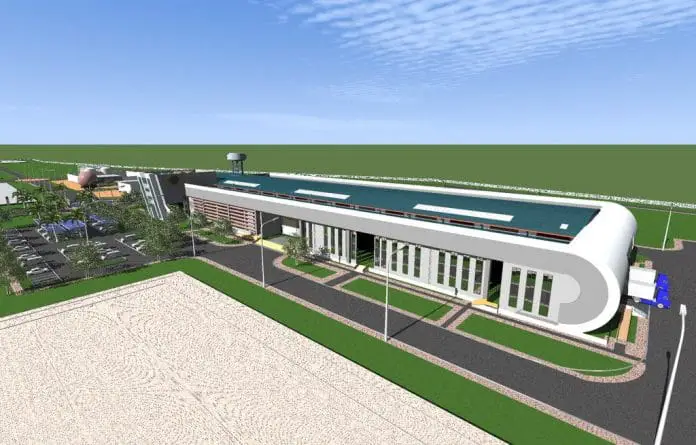Thomas Tayebwa, the Deputy Speaker of Parliament, recently pledged to Kiira Motors Corporation, currently building the Kiira vehicle plant, at Jinja Industrial Park, the support from Parliament. The CEO, Paul Musasizi, and the Executive Chairman of Kiira Motors, Prof. Sandy Stevens Tichodri-Tagboa, led the Deputy Speaker on a tour of the Jinja-based plant recently.
The facilities for the Kiira vehicle plant’s first phase include an assembly shop, in-plant circulation roads, a perimeter fence, a warehouse, a wastewater treatment plant, site drainage, and utility distribution.
Makerere University consultants are supervising the construction. The project is being carried out by UPDF through National Enterprise Corporation.
Mr. Tayebwa expressed his satisfaction with the work being carried out by the National Enterprise Corporation. The Corporation is the UPDF’s commercial arm. Mr. Tayebwa pledged that Parliament, where he works as deputy speaker, will take all necessary steps to ensure the successful completion of the vehicle plant.
The deputy speaker continued by saying that the project needs more support. He claimed that it shouldn’t be a project that is only pushed by the president alone. He added that it is a significant initiative for the nation. The deputy speaker stated they are proud of it as a country.
Mr. Tayebwa challenged Kiira Motors Corporation to operate the facility with the mindset of the private sector. He cautioned the workers not to operate like public servants. He claimed that industrialization and manufacturing are necessary for a country to undergo full transformation.
The plant will first produce 9 buses per day, eventually ramping up to 22.
The project’s funding
In order to complete the construction of Kiira Motors Corporation’s (KMC’s) vehicle plant project, President Museveni recently ordered that UGX 141 billion be issued to KMC. The money should have been used for road construction in the current fiscal year.
The plant’s completion would produce returns faster than the road’s construction. This is according to President Museveni. He made the statement when he laid the plant’s foundation stone in Jinja Industrial Park.
The reason why the completion of the first phase of the Kiira vehicle project was delayed
The first phase of the project’s completion has been delayed due to insufficient funds. This was revealed by Paul Isaac Musasizi, the chief executive officer of KMC, among other reasons.
Kiira Motors Corporation has established synergies with the private sector and development partners. This is with an aim of exploring sustainable multisectoral backward, forward, and lateral links. The links are crucial for promoting local content participation in the development of the indigenous motor vehicle industry in Uganda.
The construction of the Kiira Vehicle Plant is expected to propel Kiira Motors Corporation along a sustainable growth trajectory. It will also take into consideration disruptive vehicle technologies, such as connected, autonomous, shared, and electric vehicles.
As a result, the transition to environmentally friendly transport options will be promoted and accelerated, significantly improving air quality, sustainable energy consumption, and Uganda’s commitment to better environmental stewardship.
The company’s target
In order to produce 30,000 buses at the Kiira Vehicle Plant for the regional market by 2030, Kiira Motors Corporation is partnering with Tondeka Metro, RentCo Africa, and Golden Dragon as the Technology Partner.
By the middle of 2023, Kiira Motors and its partners aim to have 1,030 buses on the road, 50 of which will be electric.
The project seeks to develop the indigenous motor vehicle industry through technology transfer as well as supply chain localization while modernizing public transport in urban centers in Uganda and beyond.
Reported earlier
Sep 2020
Construction of Kiira Vehicle Plant in Uganda in good progress
The ongoing construction of the Kiira Vehicle Plant at Jinja Industrial and Business Park is in good progress according to Engineer Paul Isaac Musasizi, the Kiira Motors Corporation (KMC) Chief Executive Officer.
The work done already accounts for about 58%, this includes the construction of 20,000 square meters of the Assembly Building floor, 2,800 square meters of the warehouse area, 5km of site circulation roads, water and power reticulations connected to the municipal water supply system, and the national electricity grid respectively, 1.4km drainage channel, parking areas, and perimeter fence and gate facilities.
The project began in February last year and is set to be completed within a span of 30 months. The project implementing agency, National Enterprise Corporation’s Construction Works and Engineering Limited led by Brian Buhanda, the General Manager vowed to the KMC’s Chief Executive Officer to complete the project by the set deadline of June 2021.
An overview of the future Kiira Vehicle Plant
Designed for a capacity of 22 vehicles per day or 5,000 vehicles per year starting with buses and trucks, the plant’s facilities upon completion will include an Assembly Shop, a Chassis Assembly Line, Shop Floor, Storage, and Plant Campus Circulation Roads, Power Distribution and Water Distribution network, and I.T Network Backbone.
Also Read: Uganda: A new mega pole production plant to be constructed in Wakiso District
There will also be a Paint Shop, Electrophoresis, Body Shop, Test Track, Offices, Overhead Water Reservoir, Waste Water Management Plant, Solid Waste Sorting Yard, Container Yards, Finished Vehicle Park Yard, a Showroom, Offices, and R&D Space as well as the plant Monument and Security Facilities.
The plant is projected to create approximately 14,000 jobs directly and indirectly when it becomes fully operational.
About KMC
Kiira Motors Corporation (KMC) is a State Enterprise established to Champion Value Addition in the Domestic Automotive Industry for Job Creation and Diversification of the Ugandan Economy as a Key Growth Area in Line with Vision 2040. The Equity Partners are the Government of the Republic of Uganda represented by the Ministry of Science, Technology, and Innovation and Makerere University.
